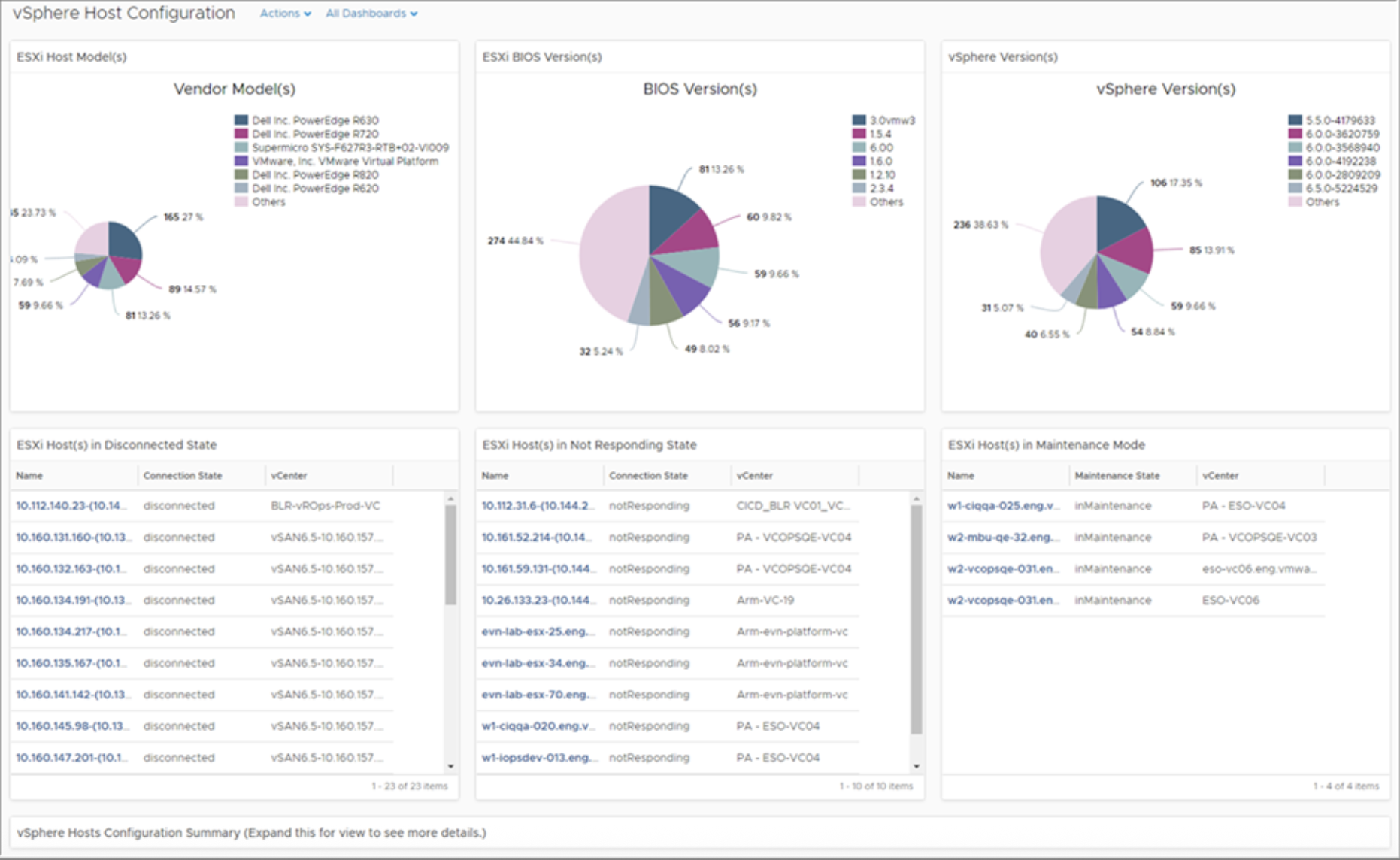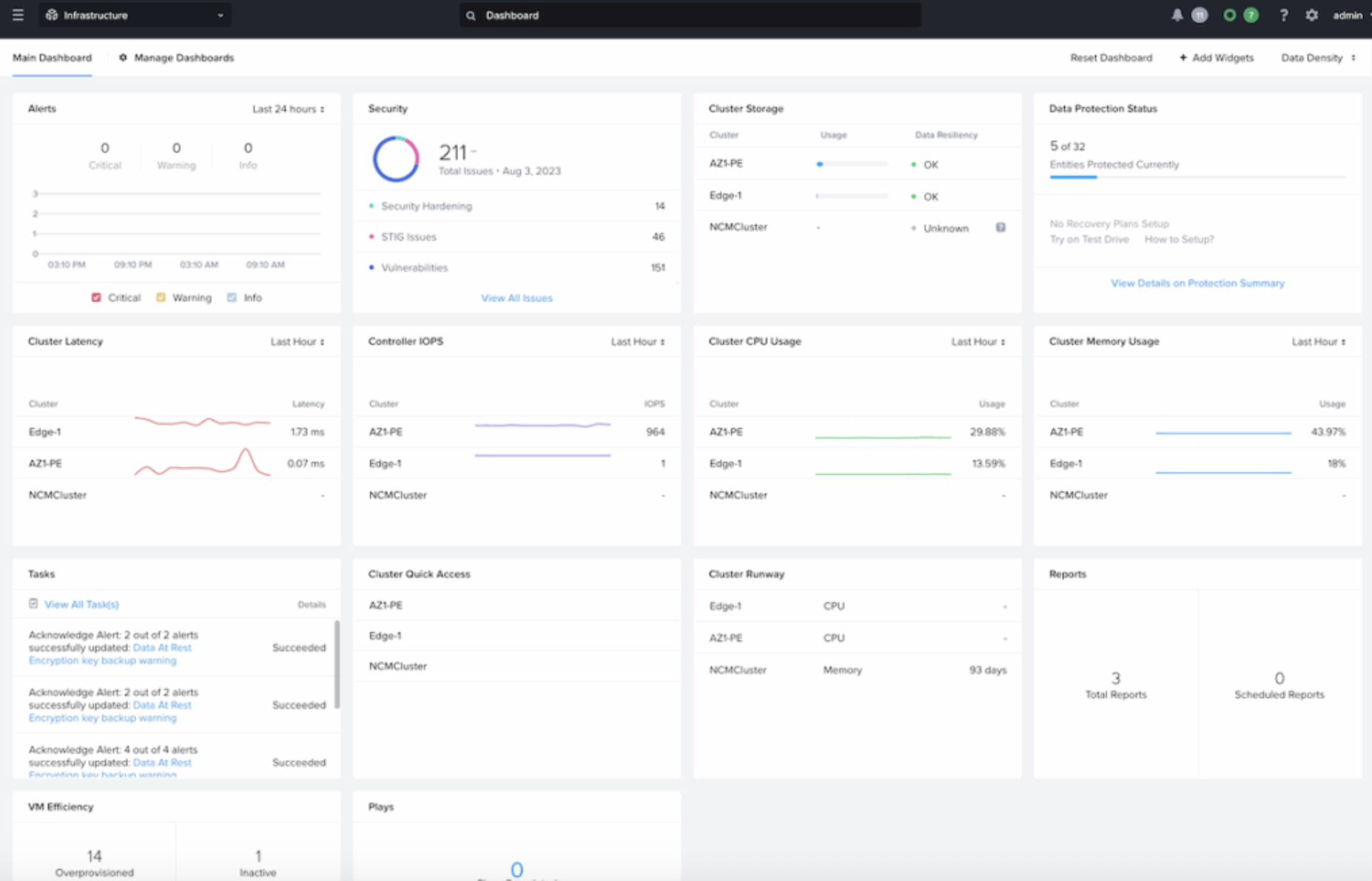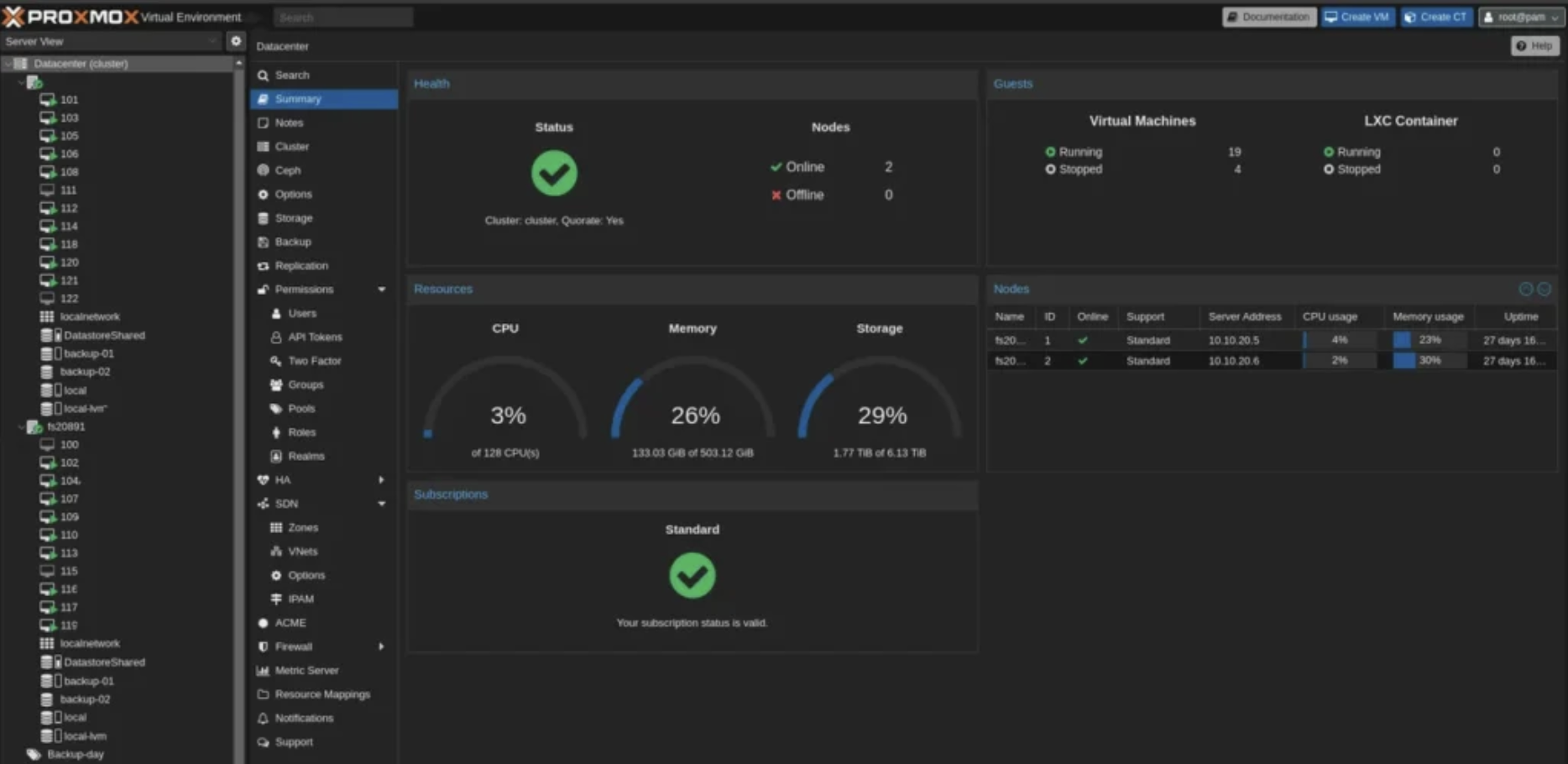
Why Are Businesses Comparing Proxmox, Nutanix, and VMware in 2025?
Private cloud is making a comeback. According to a Barclay’s survey, 83% of companies plan to repatriate workloads from public cloud back to private environments. Rising cloud bills, compliance headaches, and a need for predictable performance are driving this shift.
At the same time, the virtualization market is changing. VMware’s Broadcom acquisition has reshaped licensing models and left many mid-market businesses questioning long-term viability. Nutanix has strengthened its hyperconverged approach, while Proxmox has gained traction as a cost-efficient open-source alternative.
For IT leaders evaluating their next move, the decision often comes down to these three platforms. So, how do they compare?
What is VMware vSphere?

VMware vSphere has been the enterprise standard for nearly two decades. It provides a robust feature set and ecosystem that few competitors can match.
Key strengths of VMware vSphere:
- Mature ecosystem: Broad ISV and hardware vendor support.
- Enterprise features: vMotion, DRS, HA, and Tanzu Kubernetes Grid for container orchestration.
- Proven reliability: Trusted for mission-critical workloads in Fortune 100 data centers.
Challenges with VMware in 2025:
- High and rising costs: Broadcom’s licensing changes introduced minimums such as 72-core packs, making it costly for smaller deployments.
- Complexity: Requires significant in-house expertise and often a larger operations team.
- Lock-in risk: Customers tied deeply to VMware’s ecosystem face challenges pivoting to other architectures.
Best fit: VMware remains a strong option for large enterprises with established VMware investments and the budget to sustain ongoing licensing costs.
How Does Nutanix Compare to VMware?

Nutanix offers an alternative approach with its hyperconverged infrastructure (HCI). Nutanix AHV integrates compute, storage, and networking under one management plane, with an emphasis on cloud-like simplicity.
Key strengths of Nutanix AHV:
- Turnkey experience: Prism UI makes deploying and managing clusters straightforward.
- Cloud extensibility: Nutanix Cloud Platform integrates with AWS and Azure for hybrid needs.
- Enterprise partnerships: Supported by leading OEM vendors, Citrix, and Red Hat.
Challenges with Nutanix in 2025:
- Premium pricing: More affordable than VMware in some cases, but still a premium solution.
- Ecosystem lock-in: Simpler than VMware, but Nutanix customers are encouraged to stay within its ecosystem.
- Scale bias: ROI improves as cluster sizes grow; smaller deployments can feel expensive.
Best fit: Nutanix is well-suited for enterprises that want a turnkey HCI platform and are willing to pay for simplicity, scalability, and vendor partnerships.
Why Is Proxmox Emerging as a VMware Alternative?

Proxmox Virtual Environment (VE) is an open-source platform that combines KVM virtualization with LXC containers. It has surged in popularity among IT teams seeking flexibility and cost control.
Key strengths of Proxmox VE:
- Affordability: The core platform is free, with optional enterprise support.
- Flexibility: No restrictive licensing; native support for containers and Ceph-backed storage.
- Performance: Near bare-metal speeds with clustering for scale.
- Community-driven: Open development model with rapid innovation.
Challenges with Proxmox in 2025:
- DIY burden: Out-of-the-box Proxmox requires expertise to configure for enterprise production.
- Ecosystem maturity: Fewer “out-of-the-box” integrations compared to VMware.
- Perception gap: Some enterprises still view open-source as risky without a trusted partner.
Best fit: Proxmox is ideal for mid-market businesses and cost-conscious enterprises that want freedom from vendor lock-in and affordable scalability.
This is where HorizonIQ steps in. We offer the first U.S.-based fully managed Proxmox private cloud, making it business-ready with production-grade infrastructure, Ceph storage, Compass monitoring, and 24/7 support.
Looking to migrate without overlap costs?
Migration shouldn’t drain your budget. With HorizonIQ’s 2 Months Free, you can move workloads, skip the overlap bills, and gain extra time to switch providers without double paying.
Get 2 Months FreeHow Do Nutanix vs VMware vs Proxmox Compare?
| Criteria | VMware vSphere | Nutanix AHV | Proxmox VE (Managed by HorizonIQ) |
| Cost Model | Premium licensing; costly per-core packs | Subscription-based HCI pricing | Free core; low-cost support; HorizonIQ adds predictable month-to-month |
| Scalability | Enterprise-grade, global scale | Strong for large clusters; node-based | Modular growth; AI-ready hardware options |
| Ease of Use | Mature but complex | Intuitive Prism UI | Simple web UI; HorizonIQ removes DIY complexity |
| Ecosystem & Integrations | Broadest ISV/hardware support | Strong vendor ties, hybrid extensions | Open APIs, container-native, growing ecosystem |
| AI & Modern Workloads | Supports GPUs + Tanzu | GPU-enabled HCI nodes; hybrid AI | Optimized for ML/AI with GPU-ready hardware |
| Support Model | Enterprise VMware support | Nutanix enterprise support | HorizonIQ-managed with white-glove, 24/7 support |
| Best Fit | Large enterprises w/ sunk VMware costs | Enterprises wanting turnkey HCI | Mid-market or enterprises seeking cost savings + freedom |
Which Platform Is Best for Your Business?
The right choice depends on your size, budget, and goals:
- Choose VMware if you’re a Fortune 500 company with deep VMware investments and mission-critical workloads that rely on its ecosystem.
- Choose Nutanix if you want a simple, cloud-like private infrastructure and have the budget for premium HCI.
- Choose Proxmox if you want an affordable, open, and flexible platform that scales without being trapped by licensing or vendor lock-in.
How Does HorizonIQ Make Proxmox Business-Ready?
For many businesses, Proxmox checks the boxes on cost and flexibility but requires expertise to deploy securely and at scale. HorizonIQ bridges that gap by offering:
- Managed deployment & scaling: No need for in-house Proxmox experts.
- Enterprise-grade reliability: Ceph-backed HA storage and redundant clusters.
- Compass platform: Unified visibility into costs, performance, and monitoring.
- Predictable pricing: Month-to-month contracts with savings up to 70%.
- AI-optimized infrastructure: Hardware tiers purpose-built for ML/AI and GPU-heavy workloads.
- White-glove support: Dedicated engineers acting as an extension of your IT team.
In other words, HorizonIQ gives you the enterprise polish of VMware and Nutanix without the enterprise price tag.
Why HorizonIQ Recommends Proxmox
VMware and Nutanix will continue to dominate at the top of the market. But for businesses that need enterprise-grade performance without the enterprise price tag, Proxmox offers the sweet spot: flexibility, cost efficiency, and scalability.
At HorizonIQ, we run our own internal infrastructure on Proxmox. It’s proven to deliver the same enterprise-grade performance of VMware—without the enterprise price tag.
With HorizonIQ’s managed Proxmox offering, businesses get:
- Up to 70% cost savings with predictable contracts.
- Full compliance and security in dedicated, single-tenant environments.
- Scalability across 9 regions, ensuring low latency and global reach.
- Proactive monitoring through Compass, eliminating IT blind spots.
The private cloud resurgence is about finding the right balance of cost, control, and scalability. That’s what HorizonIQ’s Proxmox solution delivers.
Final Takeaway
If your business is reevaluating virtualization in 2025, the choice comes down to legacy stability (VMware), turnkey HCI (Nutanix), or open flexibility (Proxmox).
At HorizonIQ, we believe the future belongs to those who demand performance without complexity, and scale without surprises. That’s why we invested in making Proxmox business-ready for organizations that want enterprise-grade infrastructure without the cost or lock-in.
And if your workloads rely on VMware, we got you covered. HorizonIQ continues to support VMware alongside our Proxmox Managed Private Cloud, giving customers the freedom to choose the platform that best fits their needs.
Explore HorizonIQ’s Managed Private Cloud and see how we can help you cut costs, simplify IT, and scale with confidence.
Learn More About Private Cloud Platform Comparisons
Looking to dive deeper into how different virtualization and private cloud platforms stack up? Check out our other comparison guides:
- Proxmox vs Hyper-V: Which Hypervisor Is Right for You?
- Proxmox vs VMware vSphere: Architectural Differences Explained
- VMware Alternatives in 2025: Best Options for Cost, Flexibility, and Scale


